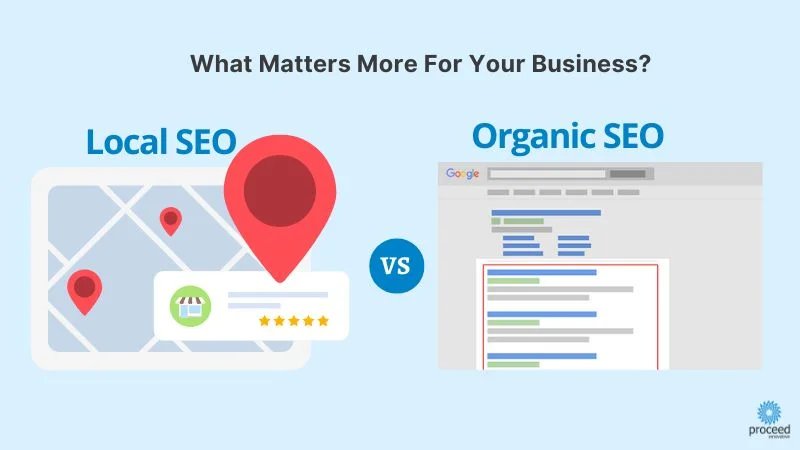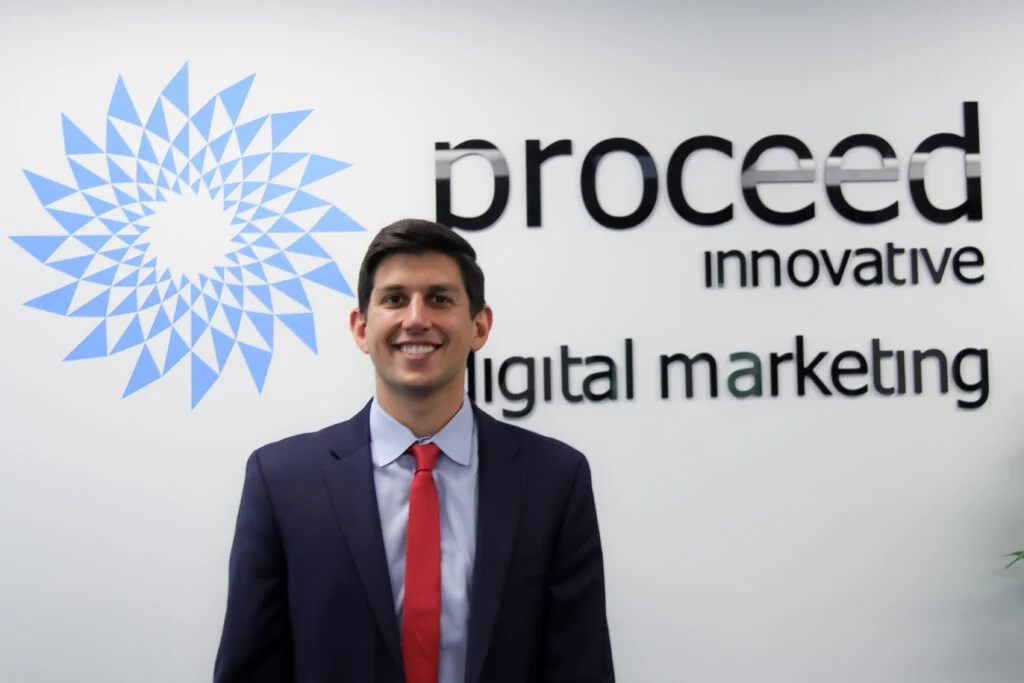Table of content
Summary: Generative AI is transforming content creation and search engine optimization (SEO), which has its benefits—such as faster content production—and its drawbacks, including generic or inaccurate content. Despite AI’s capabilities, the human touch remains essential for creating content that is engaging, credible, and aligned with Google’s E-E-A-T principles (Experience, Expertise, Authoritativeness, and Trustworthiness). Search engines are increasingly using AI to generate direct answers, changing how users access information. To succeed in this new landscape, businesses must combine AI tools with human insight, prioritize originality, and follow SEO best practices. Ultimately, quality, authenticity, and trust remain key to effective content marketing.
Creating quality content that provides value and establishes trust with your target audience has always been an important aspect of digital marketing. Great content not only engages your audience and establishes brand authority, but also helps you achieve higher rankings in the search engine results pages (SERPs) as Google gives preference to quality content that best answers user search queries.
Over the last several years, generative AI has made a major impact on content marketing and search engine optimization (SEO). Marketers and content creators can use this technology to create new content in seconds which is why the use of content generating AI tools has skyrocketed. AI-generated content is transforming not only how brands and marketers produce content but also how search engines deliver results to provide the most relevant answers to user queries.
While generative AI tools allow for fast content creation, these tools may create content that is generic or even inaccurate. A big part of what makes content valuable and relatable to your target audience is the human touch. People are more drawn to content they consider to be authentic and are more likely to trust content that appears as if it is written by a human who has a level of expertise and experience in the subject matter that warrants their trust. In the AI era, it is still very important for all generated content to adhere to Google’s E-E-A-T principles to build trust among your audience.
In this guide, we discuss how generative AI has changed content creation and search as well as how to create AI-generated content that adheres to Google’s E-E-A-T principles and reaches your target audience.

How AI has Redefined Content Creation and Search
The creation and use of AI-generated content really took off with the development of generative artificial intelligence models that create new content by processing a large amount of text, image, and speech data and detecting patterns and context that guide the creation. This results in content that demonstrates a high level of authenticity and expertise for not being human generated. The availability and accessibility of a wide range of generative AI tools allows content marketers and search engines to quickly find, condense, and organize information.
AI-Generated Content
The use of AI technology for content creation has increased significantly in the last five years. According to a 2024 survey conducted by McKinsey & Company, 71 percent of respondents said that their business uses generative AI technology for at least one business function which is a drastic increase from 55 percent in 2023. The use of generative AI technology is expected to continue to increase as more businesses adopt generative AI technology and apply it to multiple business functions. The most common application of generative AI technology is marketing copy creation, including brainstorming topics, creating outlines, and writing the copy.
There are many generative AI tools available that can be used to create content, including popular tools such as ChatGPT, Google Gemini, and Jasper. Tools such as ChatGPT and Google Gemini leverage natural language processing to generate responses based on user prompts, with the quality of the output heavily influenced by the clarity and detail of the prompt. Jasper, on the other hand, is a specialized AI marketing tool that enables users to input details such as topic, tone, voice, keywords, and target audience to craft tailored content. Additionally, users can upload brand content, style guides, and personas to train Jasper for more precise and impactful content creation.
Generative AI tools are highly beneficial as they allow for the creation of a large amount of content in a short period of time. Depending on which tools you use, you can scale content production and ensure a consistent brand voice throughout your AI-generated content. The major drawback of AI-generated content is that sometimes it can sound generic and flat which is less engaging. AI outputs may also contain inaccuracies that can affect the credibility of your brand.
AI Search Engines
Search engines are using generative AI technology to provide direct answers to user search queries which is changing the appearance of the SERPs as well as how users find content.
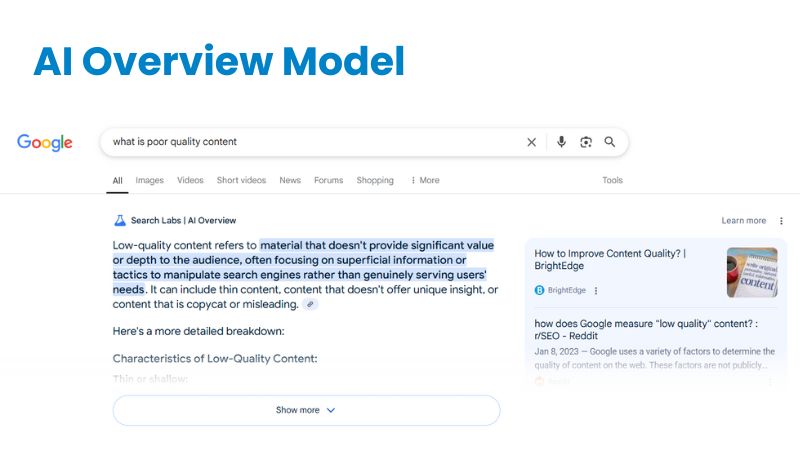
Traditionally, Google, Yahoo, and other search engines provide users with a list of websites that contain content that best answers their search queries. Using generative AI, these search engines are now providing instant answers at the top of the SERPs by pulling and combining information from the most relevant web pages. This allows users to get information about their query without visiting multiple websites. Some platforms like You.com and Perplexity integrate conversational AI into their web search which allows users to further refine their queries by asking questions in a chat format. Users on these platforms are then provided with a summary and citations to relevant websites.
It is possible for brands mentioned in AI summaries to experience an increase in traffic. Sticking to a strong SEO strategy can help your business get cited in AI summaries. However, users are less likely to scroll past the AI summaries and click on a website link if the summary answered their query.
Incorporating the Principles of E-E-A-T in AI-Generated Content
Whether AI generated or not, content that is authentic, trustworthy, and provides value to users performs the best as it is more likely to be trusted by users and rank well in the SERPs. It is important for content writers and marketers to follow Google’s E-E-A-T principles when creating content to maximize its performance.
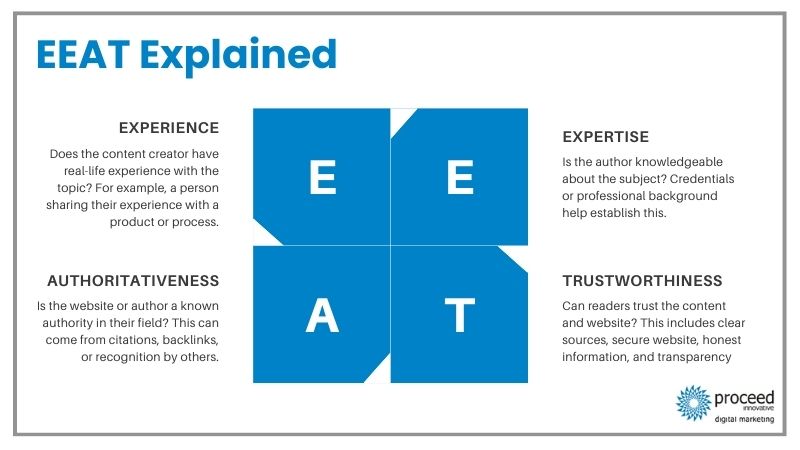
What is E-E-A-T?
E-E-A-T is an acronym for Experience, Expertise, Authoritativeness, and Trustworthiness which are the principles used by Google to evaluate the quality and credibility of website content. While E-E-A-T is not a direct ranking factor of Google’s search algorithm, Google does use data from evaluations performed by human quality raters to improve its algorithms. Therefore, creating content that adheres to these principles can improve the performance and rankings of your website.
The following is a breakdown of each of the four principles of E-E-A-T that should guide the creation of your content:
- Experience: Content is created by someone with firsthand knowledge and experience with the subject matter. Including author bios and discussing personal insights within the content demonstrate experience.
- Expertise: The content creator can discuss the subject matter accurately and in-depth to show that they have a deep understanding. Citing reputable sources also helps demonstrate expertise on the subject.
- Authoritativeness: Creating high-quality content will result in more views as well as mentions and links from other respected authorities within your industry which improves the reputation of your business.
- Trustworthiness: Businesses should be transparent about who created the content and provide accurate information regarding privacy policies, terms and conditions, and how to contact the business. Consistently creating quality, valuable content that follows ethical practices also helps build trust among your audience.
Why AI-Generated Content Must Adhere to E-E-A-T
Using generative AI tools to create content certainly has its advantages as it saves time and allows for large scale production. However, AI-generated content has its drawbacks as some of the information it provides may be inaccurate or made up, and it may leave out important details. Publishing content that is lacking or inaccurate will negatively impact the reputation of your business.
Publishing AI-generated content is not against Google’s guidelines, but the content must adhere to E-E-A-T principles and comply with other guidelines to be ranked well. Remember, Google values and rewards high-quality content that demonstrates E-E-A-T, whether it is created using AI or not. By emphasizing the importance of E-E-A-T and originality in AI-generated content, Google is devaluing low-quality and generic AI content that does not meet these standards.
You can create quality AI-generated content that performs well by ensuring that it is accurate, valuable, and adheres to E-E-A-T guidelines. All content created with AI technology must be edited and reviewed by a human to ensure that it meets quality standards. You can use generative AI technology to help with content creation in many ways, including generating topic ideas, creating outlines, and writing portions of the content. However, the final product must undergo human evaluation to ensure accuracy, improve the explanation of certain concepts and ideas, and incorporate insight based on firsthand knowledge and experience.
How to Create Quality AI Content
When creating content using generative AI technology, you should consider which steps can be automated to save time and which ones require human oversight. Striking the right balance can help you efficiently create quality, authentic content that ranks well in the SERPs and provides value for your audience.
Focusing on the following can help you create quality AI-generated content.
Incorporate Human Expertise
When using AI technology to generate ideas and content, it is important to incorporate human insight and expertise. You can find the right balance by taking the following approaches at different stages of the content creation process:
- Generating ideas: AI tools are great for suggesting topic ideas that might interest your audience. Topic ideas should be reviewed and chosen by a human to ensure that the topic is relevant to your business and audience.
- Research: AI tools can help you find information and enhance your understanding of the subject by simplifying important concepts. However, a human should dictate the direction of the research and choose which concepts should be covered and explored within the content.
- Outlines: AI tools can create detailed outlines that include headings and subheadings as well as the main points for each section. A human should review the outline and change, subtract, or add sections to the outline to better align with the goals of the content.
- Content creation: AI tools can help jumpstart the writing process by creating headings, improving phrasing, and producing a draft. The content must then be reviewed by a human to improve the quality of the writing, further refine concepts, check for inaccuracies, add information from personal experiences, and ensure that the tone is engaging.
Avoid Generic AI Content
One of the main issues with AI-generated content is that while the content may be correct regarding grammar and syntax, it may sound dry and generic. Generic content is not as engaging, and it does not stand out from your competitors. AI-generated copy is also hardly unique as these tools rely on information that is already available.
The experts who work for your business have a level of expertise and personal experience that are unmatched by AI technology. You can enhance AI-generated content and give it a personal touch by adding the following:
- Case studies involving personal experiences
- Original data and research
- Anecdotes from your experience on the job
- Discussions of best practices and industry trends
Incorporating your personal expertise and experience helps make your content more unique and authentic, which builds trust among your audience.
Disclose AI Use
As AI technology becomes more prevalent in content creation, audiences are growing more curious about how brands use it. Businesses relying heavily on AI to generate or modify content should consider openly disclosing its use. Such transparency allows audiences to understand the role AI plays in your content creation process. By being upfront about your use of AI, you not only foster trust but also help users make informed assessments of your content.
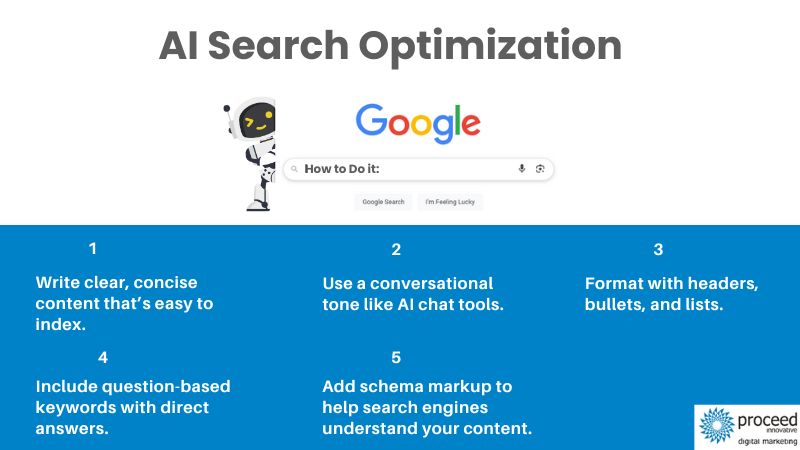
How to Optimize for AI Search
All content that you publish on your website, whether it is written by humans or created with the help of AI, must be optimized for traditional and AI search. For the most part, following traditional SEO practices can help your content perform well in the AI-generated search results. You can also take the following steps to improve your generative engine optimization (GEO):
- Create clear and concise content that can be easily indexed
- Incorporate conversational language similar to language used in AI chat tools
- Use headers, bullets, and lists to format your content.
- Use keyword phrases that are questions and provide direct answers
- Implement schema markup so search engines can better understand your content
The Future of E-E-A-T in the AI Era
As generative AI technology is being used to create more content, search engines are more concerned about value, relevance, and trustworthiness than how the content was created. It is recommended to continue to apply the principles of E-E-A-T to your content creation, whether AI or human created, but keep in mind that Google may make changes to their algorithm down the line to favor original content and check for accuracy. Creating content within these principles can help you establish your brand as an authority and increase trust among your audience.
SEO and Content Marketing from Proceed Innovative
As generative AI continues to reshape how content is created and delivered, the importance of maintaining quality, authenticity, and trustworthiness remains unchanged. While AI tools offer unprecedented speed and scalability, they cannot replace the value of human insight and expertise. By blending the efficiency of AI with thoughtful human oversight and a commitment to Google’s E-E-A-T principles, marketers can produce content that not only ranks well but also genuinely connects with their audience. As we move further into the AI era, success in content marketing will belong to those who prioritize relevance, transparency, and credibility, regardless of how the content is created.
If you want to maintain a strong SEO performance in the era of AI, you can work with a digital marketing professional like Proceed Innovative. Our team specializes in implementing cutting-edge SEO strategies and proven best practices to enhance and sustain your online visibility in an AI-driven landscape. By taking the time to understand your business, marketing objectives, and target audience, we craft highly effective SEO campaigns designed to elevate your online presence and generate valuable sales opportunities.
To learn more about our SEO services, you can call Proceed Innovative at (800) 933-2402 or contact us online.



